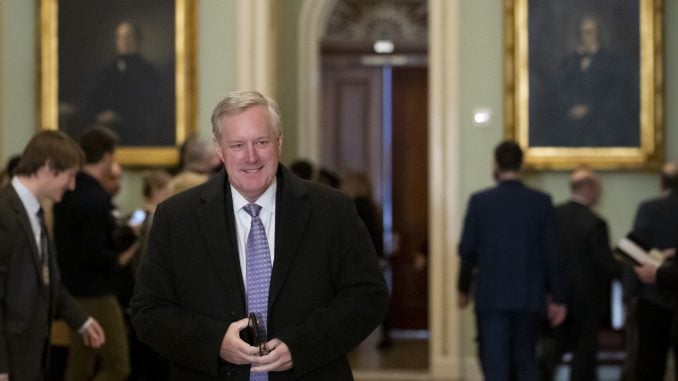
WASHINGTON, D.C. — When it came time to heave the largest aid package in U.S. history over the finish line, Republican Rep. Mark Meadows was the closer, working with Democrats to get it done.
He wasn’t just any member of Congress. In a highly unusual arrangement, Meadows pulled off a balancing act, simultaneously maintaining his seat representing North Carolina in the House while also acting as the de facto White House chief of staff during one of the biggest crises faced by any president in modern history. Meadows resigned his seat effective at 5 p.m. on Monday.
Meadows’ efforts over the last two weeks shine a light on his likely role going forward. While Treasury Secretary Steve Mnuchin and White House legislative affairs director Eric Ueland did much of the heavy lifting for the White House, Democrats and Republicans said Meadows played a key role in the late stages. The co-founder of the conservative House Freedom Caucus shuttled between Capitol Hill leadership offices and meetings with top Democratic negotiator Sen. Chuck Schumer, D-N.Y.
Meadows’ role as a compromise-seeker on a bipartisan package marked an unlikely change of roles for a lawmaker who made his name in Congress as the man who toppled Republican former House Speaker John Boehner in 2015. The Freedom Caucus declined to back the $2 trillion stimulus bill, but it didn’t oppose it either, a testament to Meadows’ ability to soothe GOP objections to the big-spending bill.
In the view of one top Democrat, he was “the closer” who knew what was needed to get the bill past the finish line and deliver on the most important variable: ensuring the deal was something Trump would agree to sign into law.
Schumer gave a shout-out to Meadows by name on the Senate floor along with Mnuchin and Ueland ahead of Wednesday’s late-night vote on the $2.2 trillion bill.
Reviled by Democrats and a thorn to Republican leadership on Capitol Hill, the Freedom Caucus has a reputation for attention-grabbing moves. The GOP’s 2017 Obamacare repeal effort was bedeviled in the House by the caucus’ stringent demands. But lawmakers recognize that Meadows has Trump’s ear, and have grown to respect his feel for the House GOP conference. He and GOP leader Kevin McCarthy have also worked to move beyond past differences.
One Republican close to the talks said that during the negotiations, Meadows worked to push the president’s priorities as the package moved through Congress. His involvement also helped temper concerns from some conservatives who remain wary of Mnuchin — a former Democrat and Goldman Sachs banker — and see him as too eager to sign onto Democratic proposals.
“Mark is respected by everyone in the House and certainly respected by conservatives in the House. I think he’s respected by everyone in the Senate, by conservatives in the Senate as well,” said Republican Rep. Jim Jordan of Ohio, one of Meadows’ best friends in Congress.
Trump announced on March 6 — as the country was beginning to recognize the dire threat posed by the coronavirus — that he had decided to replace Mulvaney as chief of staff. Mulvaney and Meadows, longtime friends, had intended to spend the interim period together at the White House to ensure a smooth transition, but those plans were partially scuttled when both men were forced into self-isolation after potential exposure to the virus. Both tested negative.
Meadows’ Congressional spokesman Ben Williamson said that during the transition, Meadows remained in Congress because it helped his office function more effectively. When a lawmaker leaves office, the House clerk’s office formally manages affairs until a successor is elected.
Jordan said he saw nothing wrong with Meadows making the transition to the White House while still in Congress.
“He was many times working for his constituents, but he was also looking at the interests of the president, particularly on policy areas and investigation areas, where he thought the president was getting a bad deal from Democrats,” Jordan said, referring both to impeachment and the Russia investigation.
Meadows’ allies say he enters the White House with realistic expectations. Rather than attempting to centralize the flow of information through his office — which predecessors have tried to do in an effort to control the impulsive president — they said he intends to focus heavily on the administration’s communications strategy and organizing the White House for the coming reelection fight.
Meadows, a longtime Trump confidant and sounding board, is known as a policy wonk with smart political instincts. House Minority leader Kevin McCarthy told reporters Thursday that Meadows would make a “great” chief of staff and strengthen the White House’s relationship with Capitol Hill.
“He’s had great relationships on both sides of the aisle, too, so it’s a benefit to all,” McCarthy said.


